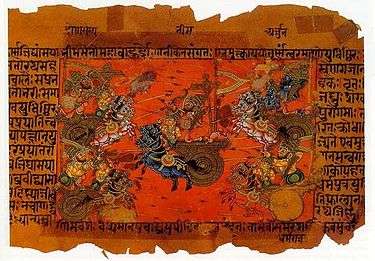Kakudmi
Kakudmi (sometimes also called Kakudmin, or Raivata, son of Revata) was the King of Kusasthali. He was the father of Revati who married Balarama. Within Hinduism, his account is given within a number of existing texts such as the Mahābhārata, the Devi Bhagavatam and the Bhagavata Purana.
Lineage
Kakudmi was a descendant of the Sun Dynasty (Suryavansha), a dynasty originating from Surya, the Hindu deity of the Sun. Surya's son was the deity Vaivasvata Manu.
Vaivasvata Manu had one powerful son named Ikshvaku. Ikshvaku founded and spread the Sun (or Solar) dynasty. He was celebrated for his accomplishments in battle and his competence and benevolence.
Ikshvaku had one hundred sons of whom Vikuksi was the eldest. Vikuksi had many sons of whom S'aryâti was one. King S'aryâti had three sons, namely Uttânabarhi, Ânarta and Bhûrishena. Ânarta's eldest son was Revata.
King Revata constructed the city of Kusasthali and ruled from there. Kusasthali grew to become a prosperous and advanced kingdom. From Kusasthali, he also ruled over large tracts of land, including Anarta kingdom which was named after his father.
Revata had one hundred sons of whom Kakudmi (also called Raivata, son of Revata) was the eldest.[1]
Character of Kakudmi
Kakudmi was of pure character, and a benevolent ruler. He had one very beautiful daughter named Revati, endowed with all auspicious qualities. Although considered human, Kakudmi seemed to have been endowed with mystic powers, not found in ordinary humans today. Kakudmi was able to take his daughter Revati with him and travel to Brahma-loka (the plane of existence where Brahma, the Creator, resides) and to speak with Brahma at will.
Meeting with Brahma
Kakudmi's daughter Revati was so beautiful and so accomplished that when she reached a marriageable age, Kakudmi, thinking no one upon earth was worthy of her, went to the Creator himself, Lord Brahma, to seek his advice about a suitable husband for his daughter.
When they arrived, Brahma was listening to a musical performance by the Gandharvas, so they waited patiently until the performance was finished. Then, Kakudmi bowed humbly, made his request and presented his shortlist of candidates. Brahma laughed loudly, and explained that time runs differently on different planes of existence, and that during the short time they had waited in Brahma-loka to see him, 27 catur-yugas (a cycle of four yugas, totalling 108 yugas, or Ages of Man) had passed on earth. Brahma said to Kakudmi, "O King, all those whom you may have decided within the core of your heart to accept as your son-in-law have died in the course of time. Twenty-seven catur-yugas have already passed. Those upon whom you may have already decided are now gone, and so are their sons, grandsons and other descendants. You cannot even hear about their names.[2] You must therefore bestow this virgin gem (i.e. Revati) upon some other husband, for you are now alone, and your friends, your ministers, servants, wives, kinsmen, armies, and treasures, have long since been swept away by the hand of time."[3]
King Kakudmi was overcome with astonishment and alarm at hearing this news.[3] However, Brahma comforted him, and added that Vishnu, the preserver, was currently incarnate on earth in the forms of Krishna and Balarama, and he recommended Balarama as a worthy husband for Revati.
Kakudmi and Revati then returned to earth which they regarded as having left only just a short while ago. They were shocked by the changes that had taken place. Not only had the landscape and environment changed, but over the intervening 27 chatur-yugas, in the cycles of human spiritual and cultural evolution, mankind was at a lower level of development than in their own time (see Ages of Man). The Bhagavata Purana describes that they found the race of men had become "dwindled in stature, reduced in vigour, and enfeebled in intellect."
Daughter and father found Balarama and proposed the marriage which was accepted. The marriage was then duly celebrated.
After the marriage
After the marriage had been celebrated, Kakudmi considered his fatherly duties to have been completed. Following the advice Brahma gave him during their meeting, he went north to the Himalayas, to Badrinath (the place where Nara-Narayana is still worshipped today) to engage in meditation and ascetic practices.
The Devi Bhagavatam describes that "according to Brahmâ's injunction, he became engaged in severe austerities in Badrinath and, when the time of death arrived, left off his mortal coil on the banks of the river and went to the world of Gods.[4]"
See also
Notes and references
- ↑ Bhag-P, 9.3.32 (see texts 27-28)
- ↑ Bhag-P, 9.3.32 (see texts 29-32)
- 1 2 Vishnu-Purana (see Book IV, chap I)
- ↑ Devi Bhagavatam, 7.8 (see texts 44-46)

